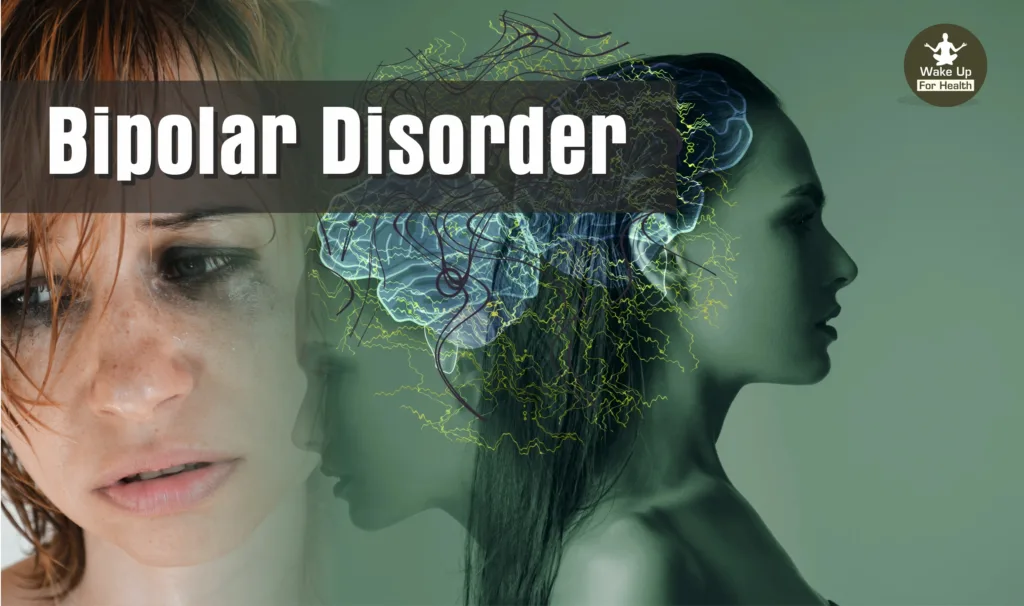People also know bipolar disorder by the name of madness. People believe that the individual who has this illness is mad. Although it definitely means a psychopath. However, this does not imply that the patient is mentally ill. This condition has to do with the person’s personality. People have nurtured many myths regarding this disease. Contrary to popular belief, it has nothing to do with double personality disorder.

A form of mood disease called bipolar disorder is characterised by manic and hypomanic episodes. Both of these problems can last from days to months. The individual may have frequent mood swings and exude an abundance of energy. People engage in a variety of activities throughout this time both day and night without being weary. This patient’s nature might last for a very long period as well. The patient may also be hypomanic.
What is Bipolar Disorder?, Managing Bipolar Disorder
A complicated mental condition called bipolar disorder causes the patient’s mind to either be tremendously elated or very depressed for weeks or months at a time. It also causes extreme mood swings. It is a cyclical disorder, in which the sufferer’s mood keeps on alternating between two different and opposite states. It is a condition that causes a sudden shift in the patient’s behaviour. Such a person suddenly gets tense and his confidence suddenly goes to the extreme. In contrast, he becomes fully tranquil in the subsequent moment. Many times, even when trying to, a person with this condition is unable to regulate his conduct. People who use drugs frequently get this condition.
Parkinson’s Disease: Causes, Symptoms, Diagnose, Treatments and Diet
Symptoms of Bipolar Disorder, Causes and Symptoms, Lifestyle Adjustments

The following signs of a manic episode (mood disorder) include :
• Increase in energy
• Sudden elevation in mood
• Increase in physical and mental activity
• Fast thinking or speech
• Making wrong decisions
• Sleep loss
• Reckless driving
• Feelings of overestimation of self
Symptoms that may occur during depressive episodes include:
• Decreased energy and fatigue
• Irritability or sadness
• Feelings of anxiety and anger
• Decreased concentration
• Excessive sleepiness or difficulty sleeping
• Either a decreased appetite or none at all
• Difficulty in concentration
• Emergence of feelings of worthlessness
• Thoughts of suicide
• Loss of interest in activities that previously brought you great pleasure
Read Also : Generalized Anxiety Disorder (GAD) | Symptoms, Causes, Types, GAD Treatment & GAD Diet
Causes of Bipolar Disorder
There are many causes of Bipolar Disorder;
1. Genetic
Research has found that bipolar disorder is also genetic. If someone’s mother or father has this disease, then there is a possibility of this disease in their children too.
2. Stress
Stress is also a reason for this disease. Too much stress in life like financial problem at home or any other mental stress can also give rise to this disease.
3. Neurochemical Factors
Dysfunction of chemical (neurotransmitter) like norepinephrine, serotonin in the body is also a major reason for this.
4. Addiction
According to research, there are more possibilities of getting this disease in people who consume more drugs. Addiction to alcohol or any other drug can also cause bipolar disorder.
5. Environmental Factors
Inability to deal with traumatic or stressful events can trigger bipolar disorder such as:
• Bad relationship
• Divorce
• Death of someone in the family
• Critical illness
• Money Problems
6. Brain Structure and Function
Variation in brain size or imbalance in certain brain chemicals may also contribute to the development of bipolar disorder.
Types of Bipolar Disorder

Bipolar disorder comes in four different forms:
Bipolar 1
This is the most serious kind of the condition. This sort of disease has the following symptoms:
• Episodes of Mania (Mood Disorder) lasting at least one week
• Episodes of depression (Lasting at least two weeks)
• Sometimes the symptoms of a manic episode (Mood Disorder) become severe enough to require hospitalization.
• Maniac and depressive symptoms can coexist.
Bipolar 2
Although a person with this type of bipolar disorder experiences episodes of depression and mania like bipolar I, the intensity of the manic episodes are less severe. Which is called hypomanic episode.
Bipolar 3
This is called cyclothymic disorder (Cyclothymia). This type of bipolar disorder affects very few people, but its specialty is that if an adult comes in its grip, it can disturb them for about 2 years and it lasts for one year in children and adolescents. However, its Symptoms are not serious, so it is not easily detected.
Bipolar 4
A few different types of bipolar disorder: People who experience unusual mood swings but whose symptoms do not match any type of bipolar disorder are called unspecified bipolar disorder.
Complications of Bipolar Disorder
(Complications of Bipolar disorder) If you do not treat bipolar disorder, then you may have to face many problems, which include:
• Gaining Weight
• Diabetes
• Risk of Heart Diseases
• Activity
• Having Suicidal thoughts
If you are a patient of bipolar disorder, then you may already have some problems like stress disorder and these problems can make your treatment even more difficult.
Treatment For Bipolar Disorder
There are many effective drugs available in the market for the treatment of bipolar disorder. These types of drugs are called “mood stabilizing” drugs. But taking any medicine without doctor’s advice can prove to be harmful. By the way, many times the symptoms of this disease disappear on their own and the patient becomes normal. But if the problem has increased, then immediately go to a psychiatrist or doctor. A little carelessness can become a big problem later on.
Apart from this, the patient should talk more with his family and friends and maintain good relations. Positive relationships have a positive effect on mental health.

Although there is no possible cure for bipolar disorder, there are a few treatments that can help reduce symptoms:
• Medicines: Your doctor may suggest the following types of medicines to control the symptoms.
• Anti Psychotics (to control symptoms)
• Mood Stabilizers (to ease symptoms)
• Anti Depressants (it is rarely used due to its side effects)
• Anti-Anxiety Medicine (reduces the risk of manic episodes)
Must Read : TMJ – Temporomandibular Joint Disorder | TMJ Treatment, Procedure and Side Effects
However, these medicines also have some side effects. If you take these medicines, you may be at risk of:
• Risk of Bipolar Depression
• Gaining weight
• These medicines take several months to show effect
• Psychotherapy: This is a therapy that addresses the thoughts, behaviors, and emotions that contribute to the disorder and changes them through proper guidance, support, and education. Many other treatments also come under this treatment which include
• Psychoeducation (this is a therapy that provides more information about bipolar disorder)
• Cognitive Behavioral Therapy
It is a therapy in which the way a person thinks and behaves is changed in order to solve the problem)
• Family Focused Therapy
In this therapy the whole family works together to heal the affected person
• Inter Personal and Social Rhythm Therapy.
• Electro Convulsive Therapy
In this therapy, the person is first given general anesthesia and then electric current is given to different parts of his brain. Due to this treatment, your depression and mania can be treated. It is given when other treatments have failed and is effective for people who are having suicidal thoughts.
• Hospitalization
This is done when a person’s depression lasts for a long time and they start having suicidal thoughts.
If you think that someone you know is a victim of bipolar disorder, then you should suggest him to seek medical help immediately because if it is not treated, it takes a more serious form.
Lifestyle For Bipolar Disorder
• Exercise Daily
By doing aerobic exercise, you get better sleep and it is also beneficial in your depression, so do exercise for some time every day.
• Take a Healthy Diet
To prevent weight gain, you have to follow a healthy diet along with exercise.
• Keep a Journal
You should keep a journal to note down your sleep patterns and mood etc. and record all these things in it.
• Avoid Alcohol and Drugs
If you consume more alcohol and drugs, it affects your physical health as well as mental health, so stop consuming them.
(Disclaimer: This article is for general information only. It is just to wake you up for your health purpose. Out intension is not to mislead or It cannot in any way be a substitute for any medicine or treatment. Always contact your doctor for more details.)
2 thoughts on “Effective Treatment for Bipolar Disorder”